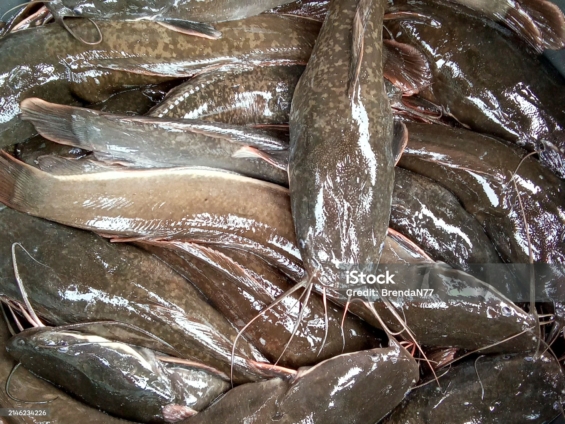A new study by researchers at the Kwame Nkrumah University of Science and Technology has revealed that the African catfish (Clarias gariepinus) can triple its air-breathing rate when exposed to high levels of carbon dioxide in water.
The African catfish is a unique fish that possesses the ability to breathe oxygen dissolved in water as well as from the atmosphere. Its air-breathing behaviour is characterised by regular swimming to the air-water interface and directly breathing air.
The researchers observed that at 40 mg/L CO₂, the fish significantly increased its breathing frequency compared to normal conditions, showcasing its remarkable adaptability to changing aquatic environments.
The study also found that the catfish adjust their breathing based on oxygen availability and temperature fluctuations.
When oxygen levels dropped to moderate and severe lows, their air-breathing rate more than doubled, reaching 1.40 and 1.23 breaths per minute, respectively, compared to 0.47 breaths per minute under normal conditions.
Temperature changes further influenced their behaviour. The study published in the Environmental Biology of Fishes observed rising water temperatures caused a steady increase in air-breathing until reaching a critical threshold, beyond which breathing declined.
Again, fish in thermally stratified water columns also adjusted their breathing rates according to the temperature of different layers.
Why this matters for fish farmers
For fish farmers, understanding the air-breathing behaviour of Clarias gariepinus is crucial for maintaining healthy stock and optimizing production.
According to the lead scientist, Dr. Kwasi Adu Obirikorang, when oxygen levels drop, catfish rely more on air-breathing. Farmers can reduce stress and mortality by ensuring proper aeration, especially in densely stocked ponds.
Again, high levels of carbon dioxide can force catfish to breathe more frequently, which may lead to stress and energy depletion. He therefore advises regular water exchange and proper filtration can help maintain balanced gas levels.
And last, since catfish increase their air-breathing rate as temperatures rise, he wants farmers to monitor seasonal variations and avoid overheating, which could push fish beyond their thermal tolerance.
By applying these insights, fish farmers can improve growth rates, reduce stress-related losses, and create better conditions for sustainable catfish farming.
Latest Stories
-
Ouattara slams Hearts fans over lack of support, urges loyalty to local clubs
2 minutes -
Minority slams government over poor handling of nurses’ strike
3 minutes -
EGL launches “Cedi Apicki Apicki” Promo to cushion consumers amid cedi appreciation
4 minutes -
Photos: Interesting images for funeral of late Mamponghene Daasebre Osei Bonsu II
6 minutes -
Bibiani GoldStars CEO confirms Frimpong Manso will stay after historic title win
17 minutes -
Ghana Internet Governance Forum 2025 promotes inclusive digital future
24 minutes -
Drivers with unapproved tinted windows to pay fine as DVLA begins full enforcement of new road worthy penalties
25 minutes -
Deploying retired nurses and midwives won’t solve ongoing strike – GRNMA General Secretary
36 minutes -
Sinapi Aba Mentorship Program hosts participants at regional network conference for sustainable business connections
38 minutes -
The illusion of control: The data we give and the control we lose
44 minutes -
Borders, boots and national pride: The World Cup as a mirror of global politics
45 minutes -
‘Our demands are not above the roof’ – Striking nurses and midwives
46 minutes -
KATH blood bank receives restocking through CCC Blook donation drive
51 minutes -
Parliament summons GUTA, Spare parts dealers, AGI, others over refusal to reduce prices despite cedi appreciation
58 minutes -
Access Bank wins Global Finance’s ‘Best Bank’ Honours for second consecutive year
1 hour

